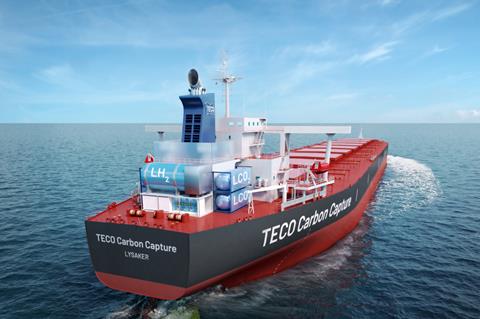The path towards net zero will start with drop-in transition fuels, progress with the adoption of carbon capture (CCS) technologies and eventually lead to adoption of low- and zero-carbon fuels produced using renewable energy, says ABS.
“For shipping to decarbonise, choosing the right pathway will be complex; but all pathways will require the use of carbon capture technologies at scale and low-carbon fuels.”
“Research into on board carbon capture and storage solutions (such as a pilot project being developed by Norway’s TECO) has accelerated since 2021.” “/ / 
Source: TECO 2030
Research into on board carbon capture and storage solutions (such as a pilot project being developed by Norway’s TECO) has accelerated since 2021.
This view is from Setting the Course to Low Carbon Shipping: Zero Carbon Outlook, the fourth in a series of outlooks designed to guide the maritime industry in decarbonization. The report examines the potential of reaching zero emissions in shipping.
Using a well-to-wake approach would ensure that the intended GHG reduction benefits from fuels are realized, and many of the most promising low-carbon fuels would require CCS to achieve low-carbon status. For example, blue hydrogen is manufactured by steam methane reforming with carbon capture.
A net zero scenario in 2050 would probably require energy for green hydrogen production equal to half of the renewable energy produced in 2021. The scaling up of renewables and the related effects of increased production will drive costs of synthetic fuels down, and ABS anticipates that green ammonia will be the most cost efficient by 2050.
Onboard CCS is in the early stages of development, but promising. Manufacturers that design onboard CCS systems will need to find ways to make them more cost competitive and resolve the CO2 storage, power consumption and space issues on vessels. Once they are proven to be technically feasible, end-of-pipe solutions will be rapidly deployed to support decarbonisation.
“According to the base case scenario, there is still going to be a notable number of vessels using oil-based fuels (28 percent of energy demand). This is why our analysis shows that the introduction of oil-based carbon neutral fuels (drop-in) could provide an important element of support, if shipping will be requested to get to net zero by 2050. This is also a key driver for the exploration of onboard emission abatement technologies such as onboard carbon capture.”





